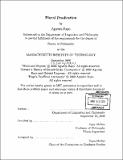Plural predication
Author(s)
Rayo, Agustín, 1973-
DownloadFull printable version (6.638Mb)
Other Contributors
Massachusetts Institute of Technology. Dept. of Linguistics and Philosophy.
Advisor
Vann McGee.
Terms of use
Metadata
Show full item recordAbstract
My thesis consists of three self-contained but interconnected papers. In the first one, 'Word and Objects', I assume that it is possible to quantify over absolutely everything, and show that certain English sentences containing collective predicates resist paraphrase in first-order languages and even in first-order languages enriched with plural quantifiers. To capture such sentences I develop a language containing plural predicates. The introduction of plural predicates leads to an extension of Quine's criterion of ontological commitment. I argue that theories containing plural predicates can have plural ontological commitments in addition to singular ones. In this sense, I argue that the subject-matter of ontology is richer than one might have thought. Plural predicates turn out to be tremendously fruitful. For example, they provide us with natural formalizations for English plural definite descriptions and generalized quantifiers. They also allow us to state important set theoretic propositions, and give a formal semantics for second-order languages. Such a formal semantics is developed in the second paper, 'Toward a Theory of Second-Order Consequence', which is a collaboration with Gabriel Uzquiano. In the third paper, 'Frege's Unofficial Arithmetic', I consider an application of plural predicates to the philosophy of mathematics. By developing a suggestion of the later Frege, I show that any arithmetical predicate can be transformed into a plural predicate in such a way that the arithmetical predicate is true of the number of the Fs just in case the plural predicate is true of the Fs themselves. The transformation is important both because it can be put to use by nominalists about arithmetic and neo-Fregeans, and because it provides the foundations for an account of applied arithmetic.
Description
Thesis (Ph.D.)--Massachusetts Institute of Technology, Dept. of Linguistics and Philosophy, February 2001. Includes bibliographical references (p. 87-89).
Date issued
2001Department
Massachusetts Institute of Technology. Department of Linguistics and PhilosophyPublisher
Massachusetts Institute of Technology
Keywords
Linguistics and Philosophy.